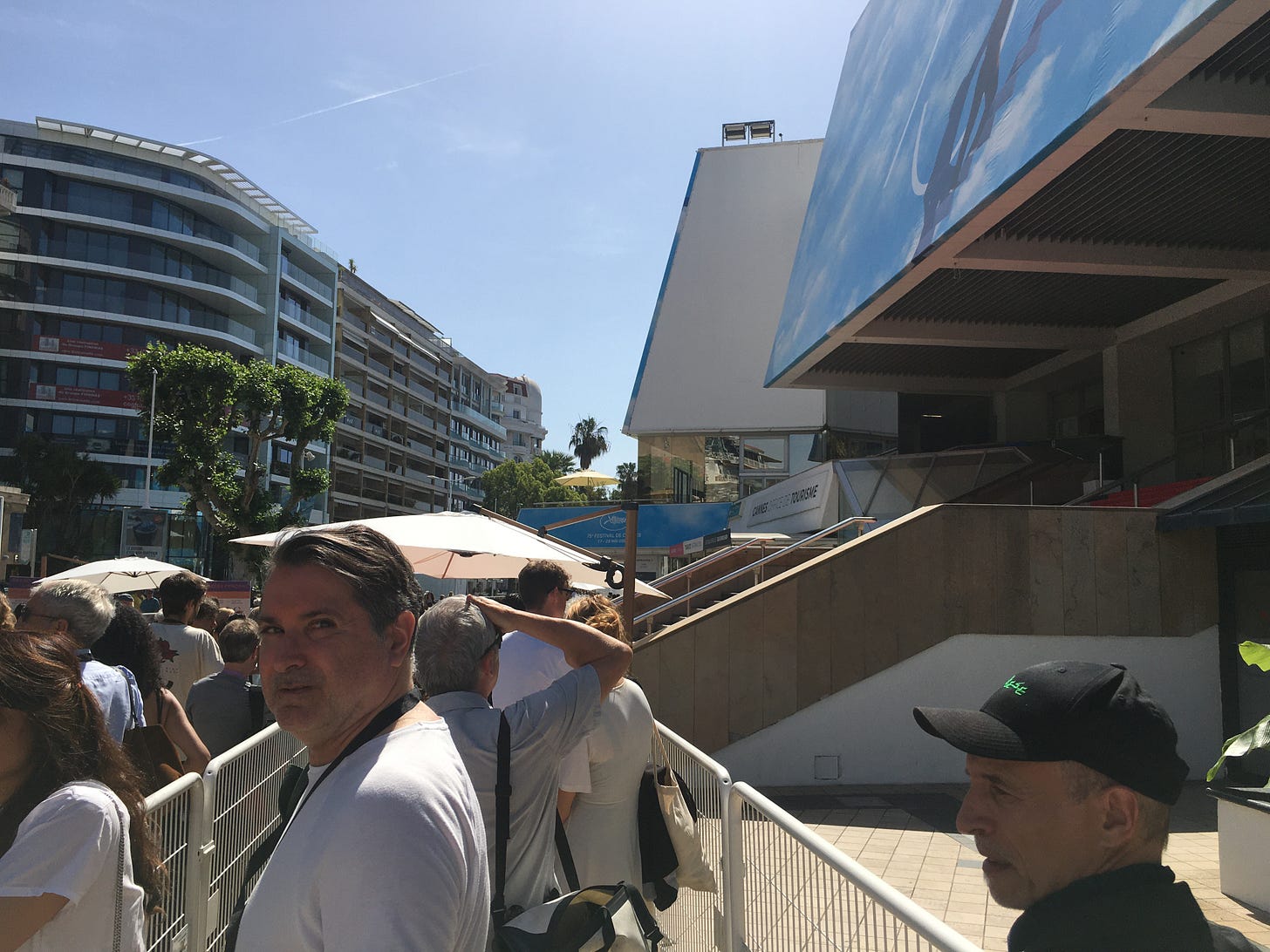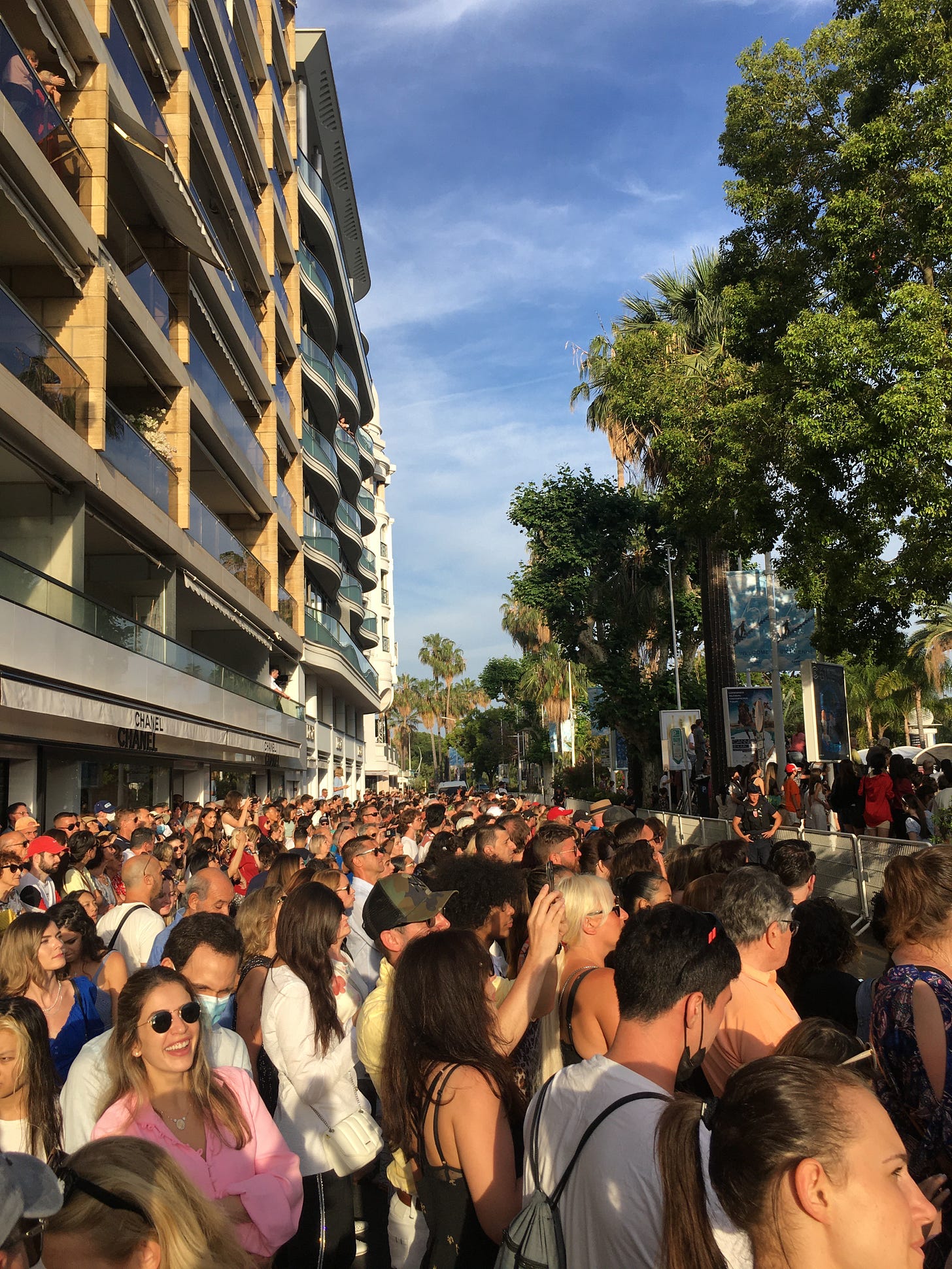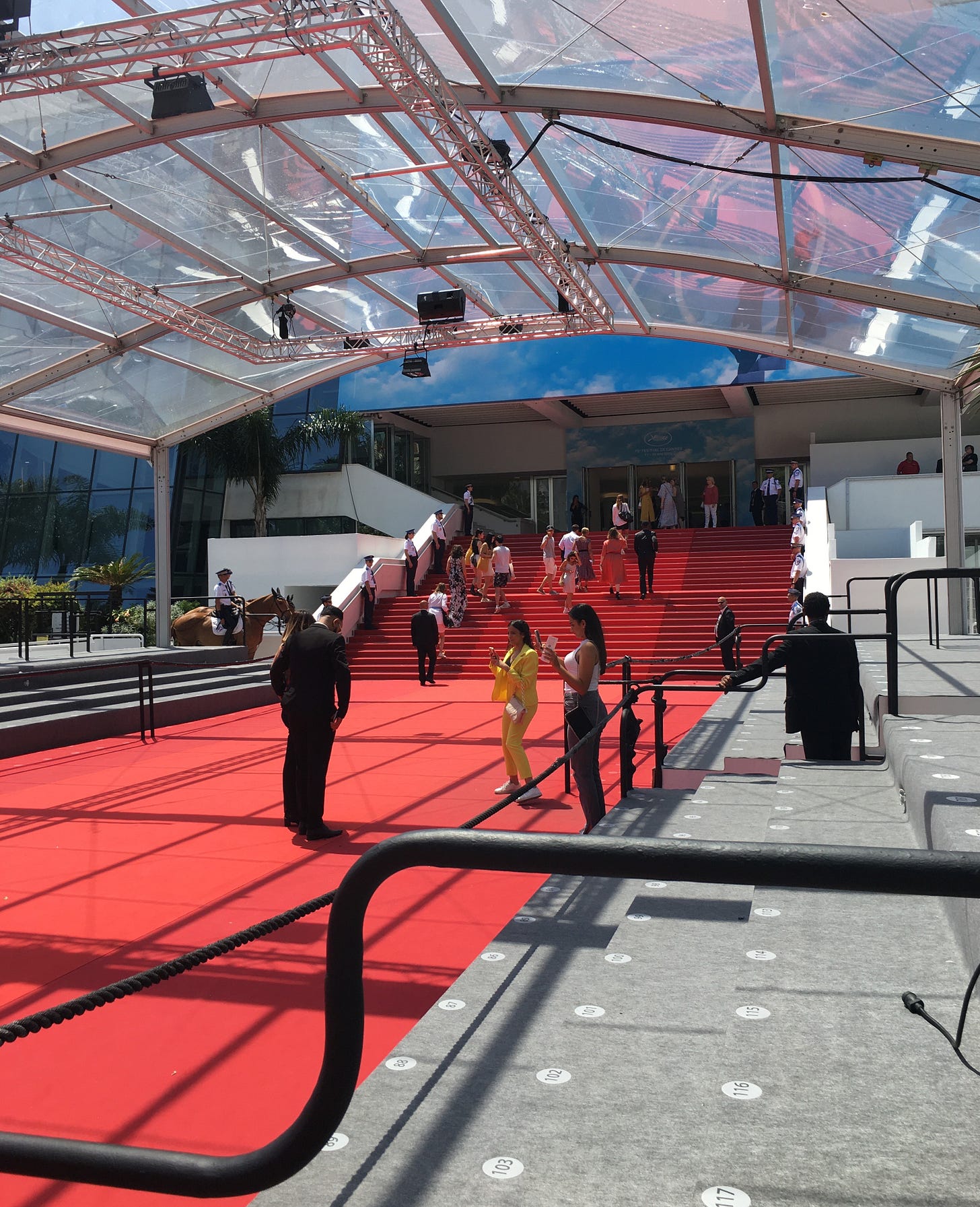The Envy Factory
Velvet ropes, cynicism, and an unshakeable sense of unreality all have their day in the sun at this year's edition of the Cannes Film Festival
Click here to listen to an audio version of this piece, read by the author.
It doesn’t take long to figure out that the Cannes Film Festival isn’t so much a concentrated orgy of glamour and extravagance as it is a facsimile of one. For my part, the illusion lasted barely 90 seconds, destroyed by the surprising percipience of a symbol which I encountered shortly after having entered the main hall of the train station in Cannes. It was a girl in her late-teens, seated at a small piano which had been placed by the station’s front entrance. Her hair was the colour of lapis lazuli, and she had an arched back. Emanating from her piano was a somewhat reticent sound, a melody off-kilter, hesitantly played. A vous de jouer read the blue sign mounted on the piano’s upper panel.
A vous de jouer. Except, such a spirit of democratisation is not without its consequences. After finally recognising, with some effort, the melody she was playing – it was the theme from Christopher Nolan’s Interstellar – my initial intrigue metamorphosed into sudden embarrassment. That she was murdering an otherwise beautiful piece was bad enough; but to murder it so brazenly, in the public eye, portended its own kind of omen. Sometimes, all it takes is the symbol. As soon as I saw the blue hair, I knew what kind of illusions Cannes would offer up.
But then, wasn’t my attendance proof that I’d bought into the dream just as plainly as this girl had? Indeed, why was I there? Why did I go? Was it simply the fact that I was, for the first time in my life, no longer a day’s plane ride away from the action? Was it for the clout? Was it because of the accreditation I received, which turned out to be not much more than a pay-to-play scheme? Or had I yet again capitulated to my irrepressible tendency towards cliché? I accept all of these explanations, and I ratify none of them. My best guess is that, somewhere along the line, I’d not only read the same sign as the blue-haired girl but, most crucially, I’d believed it. A vous de jouer. Your turn to play.
As trite as it might sound, the bluster and fanfare isn’t for nothing: entering Cannes really is like entering a new world. It’s completely encapsulating, immersive, believable, a mise en scène expertly conceived. But then, it’s also a world entirely enclosed within itself, and it functions exclusively in an insider’s language. Films and directors, production companies and acronyms, theatres and special screenings and hotels and clubs – all are mentioned in conversation with such an arrant offhandedness that, if you don’t know what someone’s talking about, you’re made to feel immediately fraudulent, and that you probably shouldn’t be there. Did you catch the Kelly Reichhardt movie? Have you seen the foyer at the Miramar? Wanna line up for Triangles of Sadness at the Cinéum? Say yes, for the love of God. Just say yes.
It’s also a world captive to a number of inexplicable social cues. A world where, for example, Letterboxd enjoys an otherwise unthinkable extent of clout, as ubiquitous on the screens of festival goers as anything bar the insuperable Twitter timeline. As we approached the end of the screening for Claire Denis’s embarrassing new film Stars at Noon, I saw someone in front of me open their Letterboxd before the screen had even gone dark. His star rating was up before the end credits began rolling. The word was floating around everywhere, voiced by a young American here, an older French there, a Malaysian here, a German there. One word, punctuating the heavy air: Letterboxd... Letterboxd... Letterboxd...
As someone who had heard of the Miramar, who knew who Claire Denis was, and who stopped using Letterboxd many years ago, I felt perfectly counterpoised between all of it. Buttressed by an irrepressible instinct for pretention, I chose to use my familiarity with this world to assert my critical distance from it. Yes, I wasn’t merely counterpoised; there were times when I simply felt myself above it all.
Which, I suppose, is merely a manner of reaffirming the natural order of things. Cannes is nothing if not an exercise in partitioning and hierarchy. So essential is this partitioning to the fabric of Cannes that, at times, it feels as though the hordes of writers and critics who come to Cannes from all corners of JFK Airport come exclusively to gauge just how this mysterious phenomenon works. The vibe report on Cannes 2022 published in The Baffler made an attempted pithy summation of the mechanics of Cannes. “But foremost,” it proclaimed, “the hierarchy is this: there are those at Cannes and those who are not, and this is what allows the festival to function.”
Except hierarchies are seldom so clear, and seldom so inclusive. No; contrary to such thinking, simply buying a ticket to Cannes does not a Cannes insider make. Truer it would be to say that Cannes is a series of enclosed worlds within one greater enclosed world, and none of them, not a one, make any pretence at inclusivity. Instead, an intense, self-enforced exclusivity is the functional ethic, the rule with no exception. It is also, to some degree, a part of the charm. People dressed either like flight attendants or bouncers guard every passageway and every door. Everyone has one eye on your accreditation badge, upon collection of which, as an aside, you’re also given a booklet which delineates the particulars of your level of access. Yes, you’re allowed to go here; but don’t even think about going there. The velvet rope is the symbol de rigueur of the festival, and no one, no one, who is not a permitted person will ever cross it by accident.
The game, then, is to become permitted. This is the aesthetic of Cannes. In an environment where you’re either in the envied class, or trying to position yourself to sneak into the envied class, there is only one way to play: you must adopt an aesthetics of envy. You must wear your lanyard everywhere, even if you’re just walking along the beach. You must keep to the Croisette and not be seen wandering off north of the Gare. You must line up in front of the Grand Théâtre Lumière wearing wayfarers and a tuxedo, while the Riviera sun cooks you alive.
I tried my hand at striking the pose. It was a choice made somewhat despite myself; but then, I was there – sun-dazed, caught up in the insane frivolity of it all, the 35-euro mains and the polished shoes – and I really had no good reason not to. Of course, there was also the presence of a particularly persistent friend and fellow writer whose sole purpose while on the Riviera was to note down enough “content” so as to pull off her sophisticated, detached and appropriately cynical vibe report which she was on assignment to write. It was she who denied me my own self-indulgent refusal to go along with their game. After all, she would remind me, weren’t we there to play?
But after we were rejected from a beachfront party celebrating the end of the Director’s Fortnight selection, I didn’t need a second opportunity to be told where I truly sat. The pitying shake of the head from the club security guard was an unambiguous message: you, Monsieur, are a normie. Haven’t you been paying attention? We’ve been telling you so every minute, every hour, for three days straight.
I knew it even more deeply while waiting in line for the new Kore-eda Hirokazu film, Broker. While we all stood there, burning beneath the midday sky, my eyes drifted over the tail of the queue behind me. A tall ruddy sort of guy, wearing khaki cargo pants and a black shirt branded for a gaming company, was talking to a short and rather cute French girl who was waiting in line behind him. Having overheard most of the lecture he was giving her on the “cinematic technique” on display in the new David Cronenberg movie, Crimes of the Future, I couldn’t resist turning to look. The boredom plastered on her face, her submissive nodding, his air of utter cluelessness – it was a scene worthy of Eric Rohmer or a Hopper painting. And then there was me, standing there, watching on. And what, in the end, really separated us? Ten or so spots in the same line – that’s it. Any other distinction was trivial; we were all normies, trapped beneath the scorching sun.
I got to the end of the festival having already come down from my realisation that Cannes is just a normie paradise. By then, it was yet another lame conclusion which didn’t seem to reveal anything. Is this it? I couldn’t help asking myself. I loitered around the Croisette during the closing ceremony to see if I could spruik a more potent insight – or perhaps I wanted to play the game just one last time.
It was a scene of noise and empty whimsy. From where I stood, peering through a dense foliage of backpack-toting middle-agers and scantily-clad teenyboppers, I could see the luminous glow of the red carpet, snaking up the steps which lead to the Grand Théâtre. All of us held forth there like lost birds, overpowered by the aesthetics of envy, trying to catch a glimpse of something we didn’t fully understand. After all, that was more or less why we had all come to Cannes. Is this it? was the ubiquitous question around which all of our regular lives centred: and we were now here to brush up against another reality, one where it is never enough because it’s never just it.
And that was what made it unmissable. It was all unreal, and the sense of unreality kept insisting upon itself. After a few moments I could no longer hold my gaze towards the star-studded tapis rouge. My eyes kept drifting away, searching for something more. I looked to my left and saw a baby, prostrate on the marble step of the Dolce and Gabbana store, wailing uncontrollably. I looked to my right and saw a man in a wheelchair, stationed a few steps from the curb and many more steps from the fence, shrouded by the moving mass, clearly unable to see anything of what was going on. My gaze wandered further. I saw Ukrainians holding plaintive signs, men and women of the Riviera with skin like warped leather, young men in tuxes trying to barter their way into the ceremony, Arabs sporting Fendi sunglasses, café workers taking their smoking break.
All of a sudden, the line which I’d begun following the moment I’d encountered the blue-haired pianist had finally found its corresponding end, and I was opened onto a world which felt complete, and which rang true. It was, I realised, a world of hollow walls plastered over with shoddy material, a world of big regalia on small people. A post-Empire world, revealed in the moment where, somewhere on the borders of the dream, the seams showed themselves. A flash of illumination had seared the skin of the Cannes enclosure, and standing there, anonymous, resigned to my side of the fence, I realised that what actually separates the haves and have-nots of Cannes is something akin to frosted glass. The trick is to wait for the moment where the partition lifts – and it always does.
Though the importance of this insight is, admittedly, questionable. It depends on who you ask. Gazing upon the wan faces of Cannes’s hidden figures, I felt as though my experience had come full circle. But in front of me, the noise and the flashing lights continued on as before, regardless of whether or not I was looking.
I spent my last morning in Cannes at a café by the Marché Forville. At the table in front of mine, four Irish were sat, two women and two men, one younger and one older in both cases. One of the men I thought I recognised – not as a budding star, but as the barman at Ma Nolan’s Irish Pub, just off the Croisette. (Indeed, watching the way he devoured an endless stream of cigarettes and cappuccinos left me more or less certain that this was the guy.) From what I could gauge from their foreign tongue, three of them were initiating a young blonde girl who was about to begin working with them at the pub. I watched and listened as the older woman sat up suddenly, put her hand on the young blonde’s shoulder, and confided in her with an undue frankness: “Believe me when I tell you that everything is backward here.” “What does that mean?” asked the young girl. To which the older woman responded: “I don’t know. Everything here is... weird.”
A new life was beginning in Cannes, and it felt strange. The festival was over; most of the stragglers had, by now, either caught their trains back to Paris or had hopped over to Monaco for the Grand Prix. So what was this young girl doing here? Perhaps there really are those who are at Cannes and those who are not. But I couldn’t quite make sense of it, of a life here without the festival.
In fact, I couldn’t quite make sense of any of it. My normie pose was all used up, and I had nothing left to say about my time here. Or, put in more concrete terms, I had no conclusion for this piece. So I went rummaging around my notebooks for a useful quote, something which would put it in a way I could never, whatever “it” was. I stumbled upon a passage from Albert Cossery’s novel Proud Beggars, which centres around a coterie of figures who frequent a rather slummy café in Cairo. The narrator describes the setting with an exquisitely tragicomic undercurrent: “The Mirror Café appeared to be a place created by man’s wisdom within the confines of a world doomed to sadness.”
Reading this quote, thinking about my time on the dazzling Riviera, I felt somehow condemned to repeat, in phrases and paragraphs and anecdotes many times more arduous, what Cossery was able to say in one breath. What good would my own conclusions serve? Sure, I could describe the final beachfront screening, or the “vibe” of it all; but then, why would I? I was barely even there.




